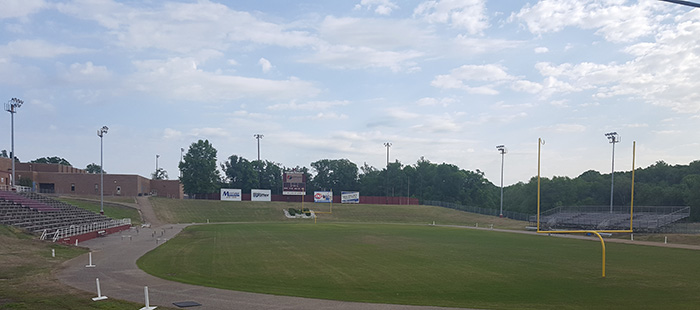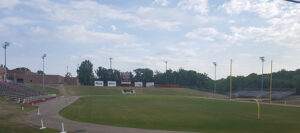
The world does not revolve around football, particularly in the midst of a global pandemic that has killed more than 56,000 people in the United States and nearly 200 in Tennessee.
Still, it’s very important to a lot of people on multiple levels.
High school coaches, TSSAA officials and local leaders are beginning to think about trying to make it happen as restaurants and other businesses in the state begin opening back up for business.
In 115 days, the 2020 high school football season is scheduled to start. Covington is scheduled to host Munford in a game that typically generates about $15,000 in gate receipts.
Right now, with schools out for the year and all spring sports cancelled, student-athletes are not allowed to work out in school facilities. Typically football players are in the weight room right now and would begin practicing in late May. Will that change soon?
Depends on what you mean by soon.
“As per the current guidelines, workouts or practices cannot be conducted until after May 22,” the TSSAA said in a statement today. “Even then, a decision by the local board will have to be made for guidance moving forward.”
Dr. John Combs, the director of Tipton County Schools, confirmed today there will not be any weightlifting or other sports-related activity going on in school facilities until May 23, at the earliest.
“There may be a few students in buildings here and there to take a specific test or to stay in a specific area before graduation, but not for weightlifting or anything else of that nature,” Combs said.
He plans on meeting with TSSAA officials next week to talk in more detail about what an offseason may look like moving forward.
“As soon as we are allowed to start making some movement there, I’m going to let the principals do that,” Combs said yesterday. “It won’t be me who holds it back. If local government, health departments and the stuff we get from the TSSAA, if all of them give us guidance on relaxing that a little bit to allow some of those trainings and practices, then I’m all on it. I want to start as soon as we can start. As soon as we see a window we’re going to take it.”
“I’m positive and optimistic, but there are some negative Nancys out there,” Kirby said. “It’s just a mixture. I’m pretty hopeful after what the TSSAA put out there.”
According to a release today on its website, the TSSAA is recommending that member schools follow state and local government, along with the Center for Disease Control and local health department guidelines, concerning social-distancing, understanding that these guidelines will continue to change from county to county as the summer progresses.
“It is totally the decision of local boards of education, directors of schools, and/or heads of school as to how much they are going to allow coaches to do face-to-face activities with their students,” said TSSAA Executive Director Bernard Childress.
High school football generates a lot of money every fall.
At Covington, a percentage of gate money from football games goes into a fund that can be used to subsidize other non-revenue sports. Including money raised by the Covington Gridiron Association, Kirby said about $80,000 runs through the football program every season. At Brighton and Munford, each sport is self-funded.
Every Friday night a home game is played there are fundraisers going on that help other sports. At Munford, student-athletes in sports like cross country and track park cars and work at concession stands to raise money. The bands at all three schools run concession stands that generate thousands of dollars.
“Football is the cash cow at most high schools,” Kirby said.

There are also things to consider that have nothing do with money.
“At the beginning of the school year the football season kind of sets the tone for the year, I feel,” said Brian Crowson, the athletic director of Brighton. “You have that excitement for football and the other fall sports going on. It kind of sets the culture in the hallways.”
“Our community loves football and it kind of sets the tone for the school with pride, tradition and culture,” said Covington principal Mark McClain. “That Charger pride, it starts with football.”
Officials with the TSSAA are making it clear that the absence of a football season would have serious financial ramifications.
In an interview with the Chattanooga Times Free Press earlier this week, Childress said, “To lose football would be devastating. I cannot see a scenario where we could survive losing football, plain and simple. It’s no secret that you could combine the postseason for every other sport and it wouldn’t add up to what football brings in. There are several other sports where even the championship tournaments actually lose money. In order to make our budget, the state has to depend on the revenue from football.”
According to the article, the TSSAA takes 50 percent of revenue generated from playoff games and teams split the remainder. Nearly a third of the TSSAA’s $3.6 million budget comes from football. The organization also receives $253,000 each year from the Cookeville-Putnam County Chamber of Commerce for the right to host the nine state state title games at Tennessee Tech.
Childress said the postseason was financially crucial and he would consider moving the start of the season back if schools do not start on time.
There’s been a lot of talk and speculation among coaches and school administrators as to when and if the season will start. At this point, no has a definitive answer.
“I think there will be one (a football season), I just don’t know when that will happen, if it will be pushed back, I just don’t know,” Crowson said. “We’re just going to have wait and see when the guidelines are set. I don’t believe we can bring in 100 kids and let them work out at the same time. I don’t think that’s going to happen right now.”
“That’s all up to people above my pay grade,” said Munford coach Slade Calhoun. “We’re next door to Shelby County so I wonder if it may be later than sooner because I believe they have the most cases in Tennessee.”
Considering the money involved and the state’s thirst for football, it seems like there will be some action on Friday nights this fall. Exactly what that will look like and when it will happen is the million-dollar question.
“I’m just like everybody else,” Calhoun said. “I’m eager to get back to work. I know the kids are eager to get back to work, but not at the cost of putting somebody in danger. We want to be as safe as possible, above board on everything and do everything the right way. We’re all eager to get back at it, but we don’t want to endanger any player, any faculty member, coaches, people at home or grandparents.”
“I’m guilty of this, too,” Crowson said. “Everybody is talking about how they’re missing sports, but we have to remember to look out for the safety of others, as well. You have to worry about the players’ safety. That’s the number one thing right now.”






Leave a Reply